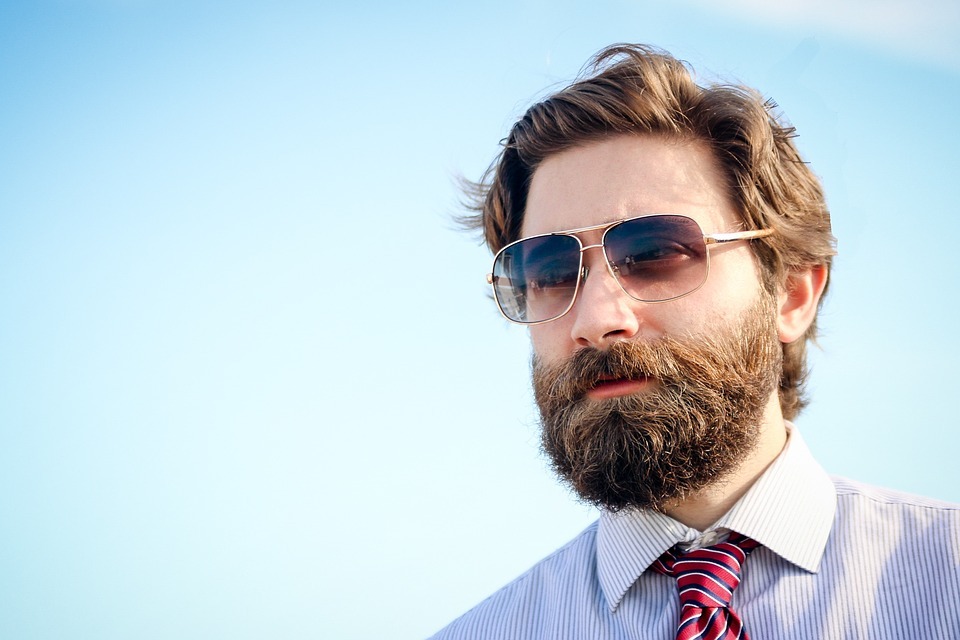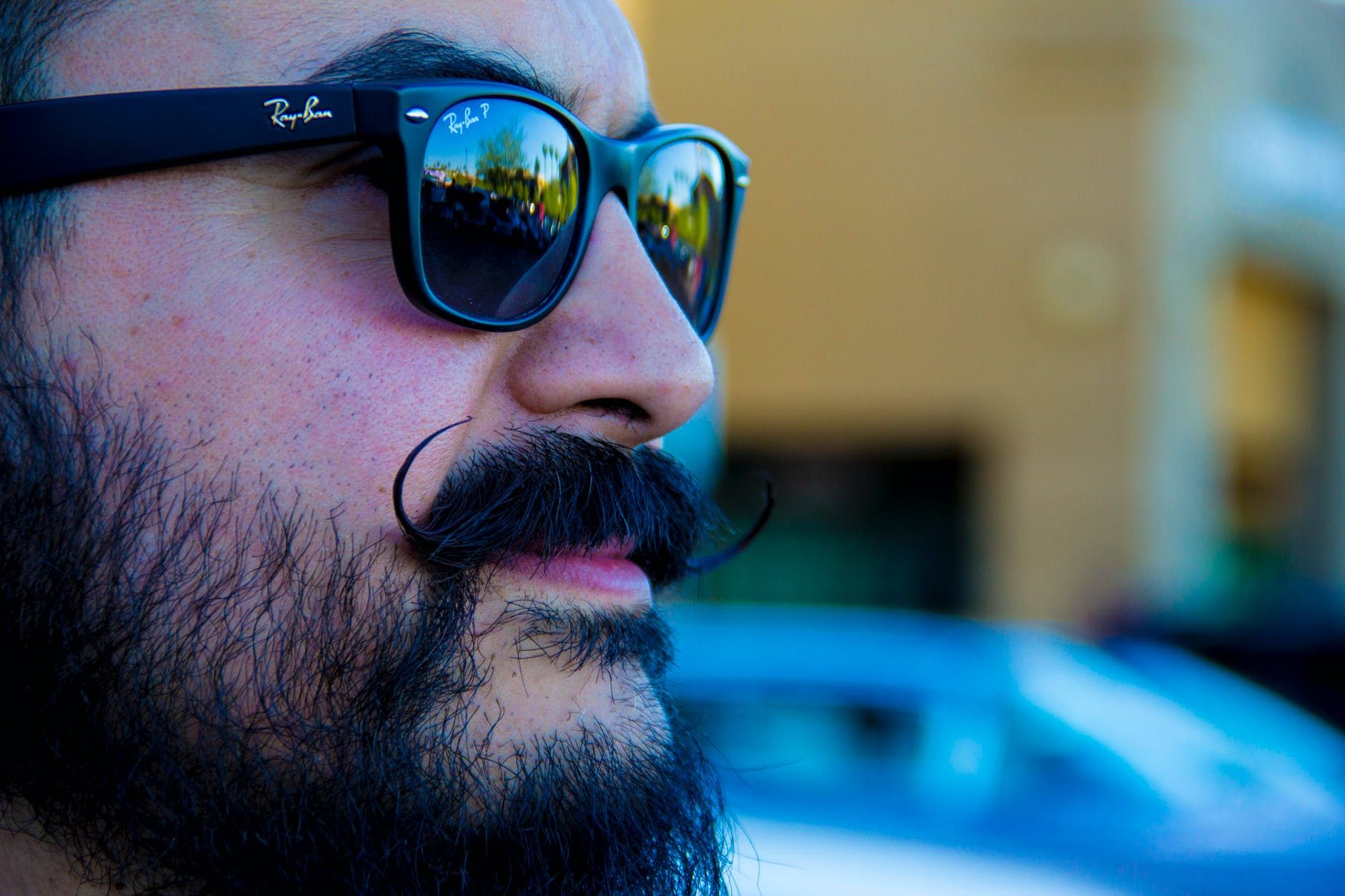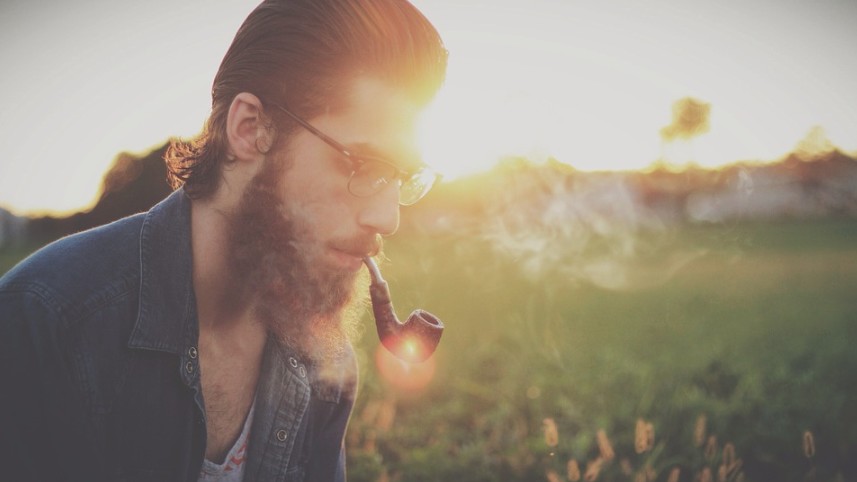What Does a Full Beard Say About a Man?
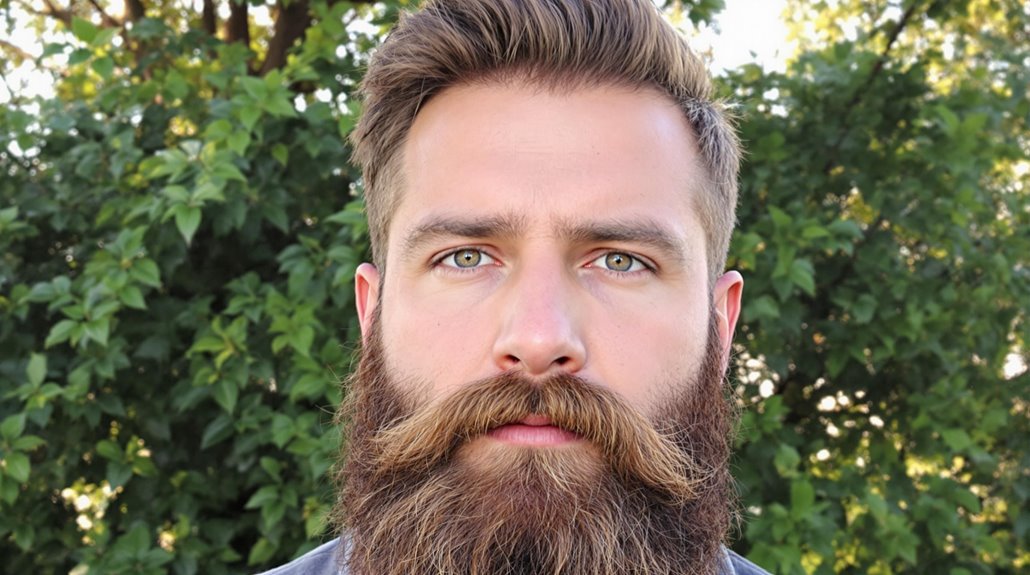
If you spot a man with a full beard, you're likely perceiving him as masculine, mature, and authoritative. Beards can project strength and social dominance, hinting at someone who's confident and possibly protective. Historically, beards have symbolized power and wisdom across numerous cultures, from ancient Egypt to Greece. Grooming a full beard suggests attention to detail and reliability, creating an impression of a well-rounded individual. Women often find bearded men appealing for long-term relationships, recognizing the stability they offer. Uncover the nuanced cultural and social factors that influence these perceptions and redefine stereotypes associated with this classic facial feature.
Beards and Masculinity
Growing a full beard often improves perceptions of masculinity, dominance, and even aggressiveness. When you choose to accept your facial hair, you're not just making a grooming decision; you're also stepping into a domain where bearded men are seen as more commanding than their clean-shaven peers. This perception isn't just a modern phenomenon—psychological studies back it up, showing that a beard can raise your social status by projecting an image of maturity and strength.
A full beard can be your silent proof of traits like power and protection. It suggests you possess evolutionary advantages linked to survival, perhaps making you more appealing as a potential mate. When people see your beard, they often assume you're older and more experienced, which naturally ties into perceptions of social dominance. These associations grant you an edge in situations where authority and leadership are valued.
Moreover, the maturity linked to full beards also ties into cultural narratives that associate facial hair with wisdom and authority. By growing a beard, you tap into this rich tapestry of masculine attributes, reinforcing not just physical strength but also intellectual and social prowess.
Historical Significance
Moving from the modern-day perceptions of masculinity, beards have deep roots in historical significance that span across cultures and periods. In ancient Egypt, beards were markers of high status and power, often linked with deities and leaders. These figures were depicted with elaborate facial hair, establishing beards as symbols of authority and social identity. The Greeks further emphasized this by associating beards with wisdom and masculinity. Philosophers, revered for their intelligence, were often portrayed with beards, underlining their cultural values and authority.
- Ancient Egypt: Beards symbolized high status and power, often linked to gods and rulers.
- Greek Culture: Beards represented wisdom and masculinity, especially among philosophers.
- Roman Times: A shift to bearded looks marked authority and respect among men.
Religious traditions like Judaism and Islam regard beards as signs of devotion, showcasing another facet of their historical significance. Beards serve as visual markers of social identity, reflecting not only masculinity but also cultural values and individual expression. They've transcended mere fashion, embodying deeper meanings that have evolved over time. By growing a beard, you're not just making a style choice; you're connecting with a rich tapestry of history and identity.
Style and Personality
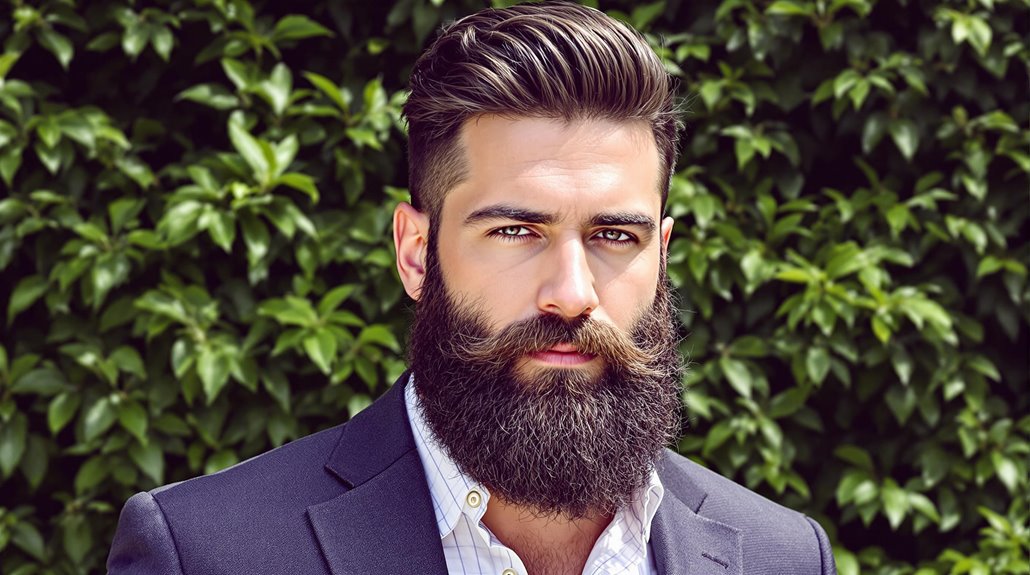
While full beards might initially seem like a simple fashion choice, they often carry deeper implications about a man's style and personality. Sporting a full beard can make a powerful statement about your masculinity, often conveying traits of dominance and strength. The act of growing and maintaining a well-groomed beard reflects a level of grooming that speaks to your attention to detail and personal care. It's not just about letting it grow; it's about shaping and presenting it in a way that aligns with your personality.
Having a full beard can show confidence, allowing you to stand out in both social and professional environments. This confidence is often interpreted as a desire to express individuality, showcasing courage and trustworthiness. People frequently view men with full beards as kind and reliable, traits that improve their personal image.
However, the boldness of a full beard can sometimes suggest excessive machoism, which might lead to perceptions of toxic masculinity. Despite this, many full-beard wearers seek to assert their presence positively, often displaying a scholarly nature and a hard-working attitude. Ultimately, your beard can be a versatile tool to reflect who you are.
Health and Hygiene
A full beard can serve as a demonstration of good health and impeccable hygiene practices. When you keep your beard well-groomed, it shows a commitment to self-care and personal grooming routines. Contrary to popular belief, studies reveal that full beards don't harbor more bacteria than clean-shaven faces, which dispels the myth that beards are inherently unhygienic.
Grooming can make a significant difference in maintaining both the beard and the skin underneath. To guarantee your beard stays clean and healthy, consider the following routine:
- Regular Washing and Trimming: Consistently washing and trimming your beard helps prevent the accumulation of food particles and dust, keeping it fresh and neat.
- Use Quality Beard Care Products: Oils and balms not only improve the appearance of your beard but also contribute to its general health. They offer nourishment that promotes a well-maintained look and feel.
- Prevent Skin Irritation: Regular grooming can make a big difference in preventing skin irritation, making sure the skin underneath remains healthy and comfortable.
Social Perceptions
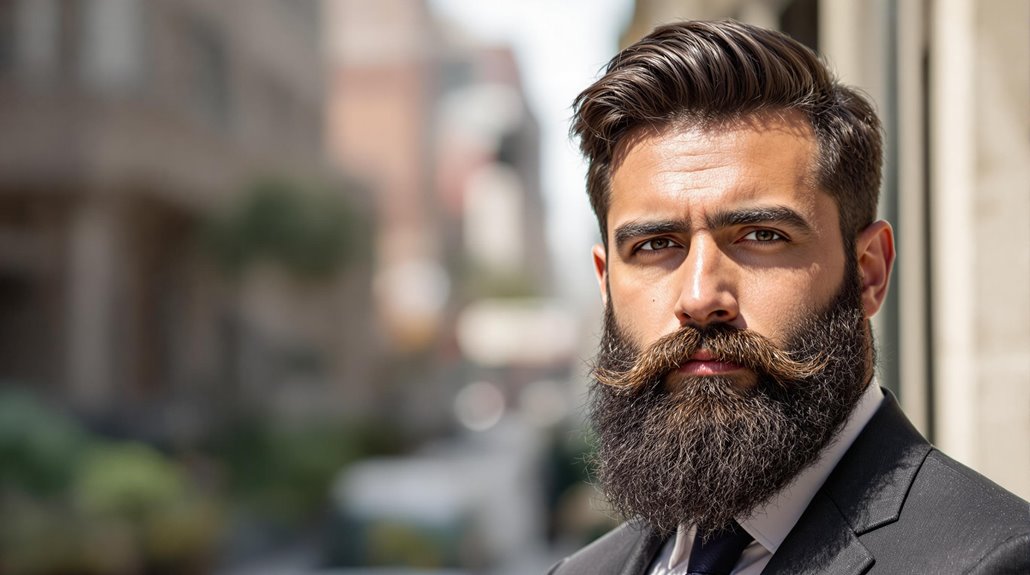
In the present society, a full beard often speaks volumes about a man's social standing and character. It's not just facial hair; it's a statement of masculinity and dominance. People often perceive a full beard as an emblem of maturity and responsibility, which can greatly improve a man's social status among peers. You've likely noticed that bearded men, particularly those with well-groomed facial hair, are often seen as more trustworthy and reliable. This perception can elevate their success in roles that rely on building trust, like sales or service positions.
A full beard can also reflect a man's confidence and individuality. It suggests a certain level of creativity and ruggedness, traits that are appreciated in social settings. In terms of attraction dynamics, women often favor well-groomed bearded men for long-term relationships. The beard adds to a man's appeal as a potential partner or father figure, increasing the perception of stability and dependability. So, if you're considering growing a beard or already have one, it's clear that a full beard carries considerable weight in shaping social perceptions and influencing how others view you.
Grooming Practices
Having investigated the social perceptions surrounding full beards, it's clear that maintaining their appeal requires dedicated grooming practices. A well-maintained beard speaks volumes about your attention to detail and personal care. Here's a straightforward guide to keeping your beard looking its best:
- Regular Trimming: To achieve a neatly trimmed appearance, regular trimming is vital. It helps maintain the shape of your beard and prevents split ends, reflecting a polished and intentional look. Pay close attention to your neckline, shaping it carefully to improve the general structure.
- Quality Beard Oils and Balms: Incorporating quality beard oils and balms into your routine can greatly promote a healthy look. These products nourish your facial hair and skin, reducing irritation and dryness. A consistent grooming routine involving washing and conditioning is fundamental to remove dirt and excess oils, keeping your beard both hygienic and aesthetically appealing.
- Professional Grooming Services: Occasionally seeking professional grooming services can be advantageous. Experts can provide specialized styles and maintenance, ensuring your beard remains stylish and well-kept over time. This professional touch can boost your beard's appearance, making sure it always looks its best.

